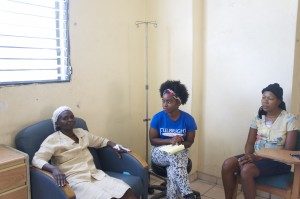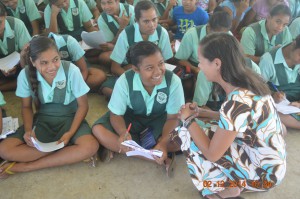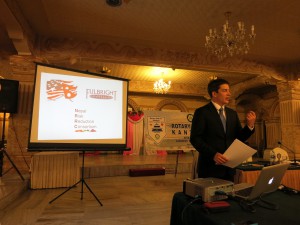
Martine Prompt, 2015-2016, Fulbright-Clinton Fellow to Haiti (center), discusses the socioeconomic impact of cancer with patients Madame Louis (left) and Melissa (right)
In honor of World Cancer Day, 2015 to Haiti Martine Prompt shares her cancer awareness work with Project Medishare as part of her overall grant objective to improve the health literacy skills of vulnerable populations as a means towards improving their overall health, and promote health equity.
“Mwen pè maladi sa, mwen pè mouri pou pitit mwen yo, men mwen gen espwa poum geri paske mwen gen konfyans nan Letènèl, sa banm plis espwa.”
“I am afraid of this disease. I fear death because of my children, but I have hoped that I’ll heal because I have faith in the Lord – that gives me more hope.”
Madame Louis and four other women sat on the chemo chair in the cancer center at Bernard Mevs Hospital as their nurse prepares them to receive their infusion. Madame Louis is a middle aged woman with a malignant tumor that was undiagnosed and untreated for a long time. In the place where her right breast should be, there is a cauliflower-shaped tumor growing through her skin. She pointed at it for me to look but she looked away, sad, angry, and shamefaced. Such enormous tumors are rare in developed countries, yet typical in Haiti. The women at the cancer center are trapped by poverty, misinformation, and stigma, which often lead to them not seeking help for breast cancer. Many are diagnosed with late-stage breast cancer when the prognosis for survival is poor. Madame Louis confirms, she has never performed a self-breast exam, nor had a mammogram. She was diagnosed, when she showed a doctor that she had blood coming out of her nipples. “Yo dim se cancer ke mwen genyen, kounye a map tann gerizon. Yo dim map geri.” (They told me I have cancer, now I’m waiting for a cure because they told me I will be cured.)
Studies confirm that breast cancer is a leading cause of death and disability among women, especially young women in low-and middle-income countries. According to the International Agency for Research on Cancer (IARC), part of the World Health Organization (WHO), low-and middle-income countries like Haiti, accounted for 57% of the 14 million people diagnosed with cancer worldwide in 2012—but 65% of the deaths. Today, cancer kills more people in poor countries than AIDS, malaria and tuberculosis combined. The high fatality rates are likely due to a lack of awareness of the benefits of early detection and treatment and a scarcity of adequate facilities for detection, diagnosis, as well as treatment.



